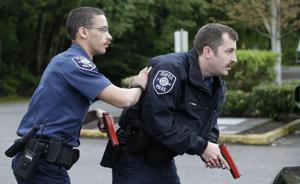Firing bad cops—and tangling with police unions—may be as hard as ever in Washington

(The Center Square) – Police reform may still be on the table for the Washington Legislature, but few bills left alive this session would make it harder for bad cops to keep their badges.
The legal protections encompassing U.S. law enforcement are many, but the two that most often keep misconduct cases from going to trial are qualified immunity and arbitration. The former, which shields officers from prosecution in all but the clearest cases of violating a person’s constitutional rights, saw a bill intended to end it die in committee last month. Attempts to limit the latter have fallen short.
When a Washington officer faces discipline or termination, they may challenge it through a private appeals process which falls to a presiding arbitrator to preside over. The resulting decisions are ones courts can be reluctant to reverse unless an arbitrator overstepped their authority or violated established public policies.
Since 2016, Seattle has seen 93 of its police officers appeal misconduct cases through arbitration, 86 of which are open years later. Much like around the state, Seattle arbitrators are police union picks armed with broad powers which include overturning cases on their own timeline.
Data on the practice is sparse. Hearings are closed to the public and are typically exempt from public records request under the terms of police union contracts.
One bill, House Bill 5134, would have had arbitration hearings include a civil service commission, a hearing examiner, and an administrative law judge. It also would have restricted arbitrators from reducing disciplinary actions without just cause. The bill never made it out of committee.
“We talk about culture and we talk about accountability, but we take away chiefs and sheriffs’ ability to set both for their departments when we take away the power to set discipline, and that’s really what it comes down to,” Monisha Harell of Equal Rights Washington told state lawmakers in January. “We want culture and accountability, but we don’t allow the people leading that culture and accountability the tools they need in order to be able to set that.”
Another bill, Senate Bill 5055, would create a statewide roster of up to 18 arbitrators for police unions to choose from. Each arbitrator would have three months to hear a case and receive a minimum of six hours training in racism and implicit bias. Few in or out of law enforcement believe the bill, which now sits on Gov. Jay Inslee’s desk, is enough to change the profit motive that comes with the job.
“We think that there is a personal financial incentive for an arbitrator to split the baby, so to speak,” James McMahan, a lobbyist with the Washington Association of Sheriffs and Police Chiefs testified in January. “Rule about half in favor of management and half in favor of labor, rather than ruling in favor of fact and public policy.”
Clallam County Sheriff Bill Benedict has never seen an arbitration case in his 15 years on the job, but says the threat of it is all too real and protects bad apples.
“In some cases, like in Seattle, it’s been too fair if that’s possible,” Benedict said. “We’ve got a lot of bad cops that are still on the job because an arbitrator didn’t agree with either the sheriff or the police chief, on outrageous, egregious conduct. I think that’s why we have the part of the reason why the public is so upset at police.”
The Seattle Police Department is still buried under nearly 100 misconduct investigations related to its policing of last summer’s street protests against such. Six of its officers are accused of joining the Jan. 6 invasion of the U.S. Capitol.
An investigation by the Seattle Times last year found that out of some 11,000 officers statewide, about 100 per year saw pink slips over the past four years. Of that number, 40 of were recommended for decertification by their bosses. None have ever lost their credentials for excessive use of force in that time.
Senate Bill 5051, which is working its way through committee, would expand the state’s criminal justice commission, the list of relevant offenses for decertification, and background checks for prospective officers. It would also ban officers under investigation from using retirement or transfers to close a case.
Transparency is the chief issue of contention for the police bills dead and alive in the Washington Legislature. Senate Bill 5259 would create a state database on use of force, an area police reformers see as a crucial first step in highlighting the scope of the problem.
Police reform has seen its share of ups and downs in the state legislature where most bills have made it off the floor along party lines. The biggest bill, HB 1054, would ban the use of tear gas and other crowd control tactics cities like Seattle have failed to ban at the local level. Republicans’ objections with most bills have concerned limiting citizen-led police review commissions and maximizing officer discretion regarding use of force, two issues Democrats have largely opposed.
The Washington Legislature’s 2021 session is set to adjourn on Sunday, April 25.
Disclaimer: This content is distributed by The Center Square

